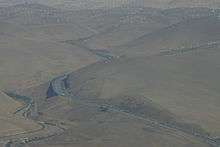Altamont Pass Wind Farm
| Altamont Pass Wind Farm | |
|---|---|
|
Turbines near Livermore, California | |
| Location | Altamont Pass, Alameda County, California |
| Coordinates | 37°43′57″N 121°39′9″W / 37.73250°N 121.65250°WCoordinates: 37°43′57″N 121°39′9″W / 37.73250°N 121.65250°W |
| Commission date | 1981 |
| Power generation | |
| Units operational | 4930 |
| Nameplate capacity | 576 MW |
| Average generation | 1.1 TWh |


The Altamont Pass Wind Farm is located in the Altamont Pass of the Diablo Range in Northern California. It is one of the earliest wind farms in the United States. The first wind turbines were placed on the Altamont by Fayette Manufacturing Corporation on land owned by cattle rancher Joe Jess.[1] The wind farm is composed of 4930[2] relatively small wind turbines of various types, making it at one time the largest wind farm in the world in terms of capacity. Altamont Pass is still the largest concentration of wind turbines in the world, with a capacity of 576 megawatts (MW), producing about 125 MW on average and 1.1 terawatt-hours (TWh) yearly.[3] They were installed after the 1970s energy crisis in response to favorable tax policies for investors.
Environmental effects
The small turbines used at Altamont are dangerous to various raptors that hunt California Ground Squirrels in the area. 1300 raptors are killed annually, among them 70 golden eagles, which are federally protected; in total, 4700 birds are killed annually.[4] Overall there has been an 80% decline in golden eagles in Northern California, with no golden eagles nesting near the facility, although it is a prime habitat.[5] Considered largely obsolete, these numerous small turbines are being gradually replaced with much larger and more cost-effective units. The larger units turn more slowly and, being elevated higher, are claimed to be less hazardous to the local wildlife. This claim is supported by a report done for the Bonneville Power Administration.[6]
As of 2010, a settlement has been reached between the Audubon Society, Californians for Renewable Energy and NextEra Energy Resources (who operate some 5,000 turbines in the area). Nearly half of the smaller turbines will be replaced by newer, more bird-friendly models. The project was expected to be complete by 2015 and included $2.5 million for raptor habitat restoration.[7]
Repowering
In 2015, NextEra, which owns some of the 100kw Kenetech/US Windpower older turbines, installed during the 1980s, agreed to remove the machines and replace them with 48 new model wind turbines. A power purchase agreement has been completed to power the Googleplex office complex in nearby Mountain View, California. The process of removing old wind turbines and replacing them with newer machines is called repowering. [8]
A portion of the wind energy center is being dismantled as of 2016. Altamont Winds Inc (AWI)'s 83MW of 100kW Kenetech turbines are being taken down. These are older models with lattice towers. It has been proposed to replace them with 27 turbines with rated capacity of 2.1MW.[9]
See also
References
- ↑ "Lodi News-Sentinel - Google News Archive Search".
- ↑ "California Wind Energy Association: Fast Facts about California Wind Energy". www.calwea.org. Retrieved 2011-02-23.
- ↑ "Altamont Pass, California - Encyclopedia of Earth". www.eoearth.org. Archived from the original on 19 May 2008. Retrieved 2008-06-02.
- ↑ Bogo, Jennifer (September 14, 2007). "How the Deadliest Wind Farm Can Save the Birds: Green Machines". Popular Mechanics. Archived from the original on June 4, 2009. Retrieved July 14, 2011.
- ↑ Paul Driessen (22 December 2012). "DRIESSEN: Big Wind tax credit exterminates endangered species". Washington Times. Retrieved 29 December 2012.
In an 86-square-mile area blanketed by the Altamont wind facility, no eagles have nested for more than 20 years even though the area is prime habitat, Mr. Wiegand says. Overall, there has been an 80 percent population decline for the golden eagle in Southern California, he notes.
- ↑ "Synthesis and Comparison of Baseline Avian and Bat Use, Raptor Nesting and Mortality Information from Proposed and Existing Wind Developments" (PDF). www.bpa.gov. Archived (PDF) from the original on 13 August 2009. Retrieved 2009-09-07.
- ↑ Andrew Dalton (December 7, 2010). Altamont Pass to Get Less-Deadly Wind Turbines sfist.
- ↑ http://www.mercurynews.com/business/ci_27503195/google-buys-altamont-wind-energy-power-googleplex. Retrieved 24 June 2016. Missing or empty
|title=(help) - ↑ "Dismantling under way at Altamont Pass". Windpower Monthly. Windpower Monthly. Retrieved 16 March 2016.
- Wampler, Steve (March 9, 1982). "Windmills are growing along Altamont Hills". Lodi News Sentinel.
External links
![]() Media related to Altamont Pass Wind Farm at Wikimedia Commons
Media related to Altamont Pass Wind Farm at Wikimedia Commons